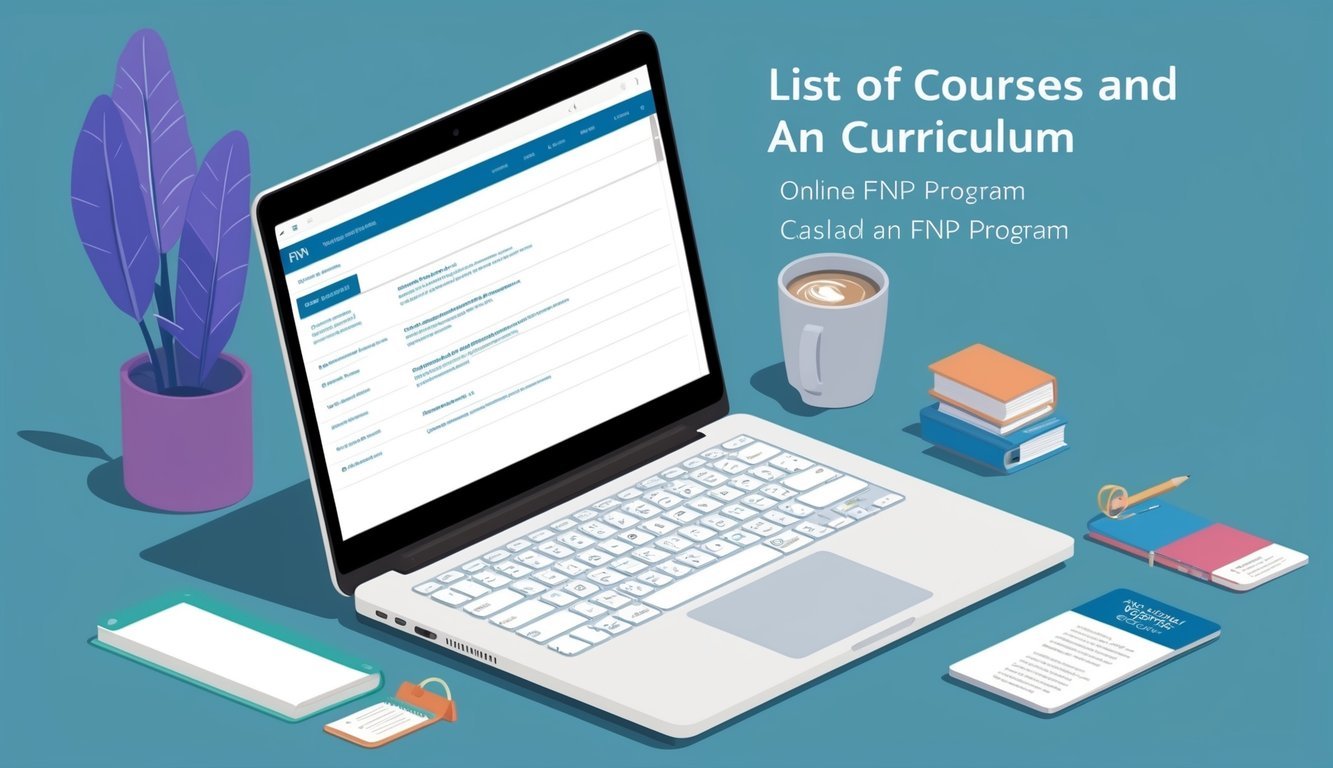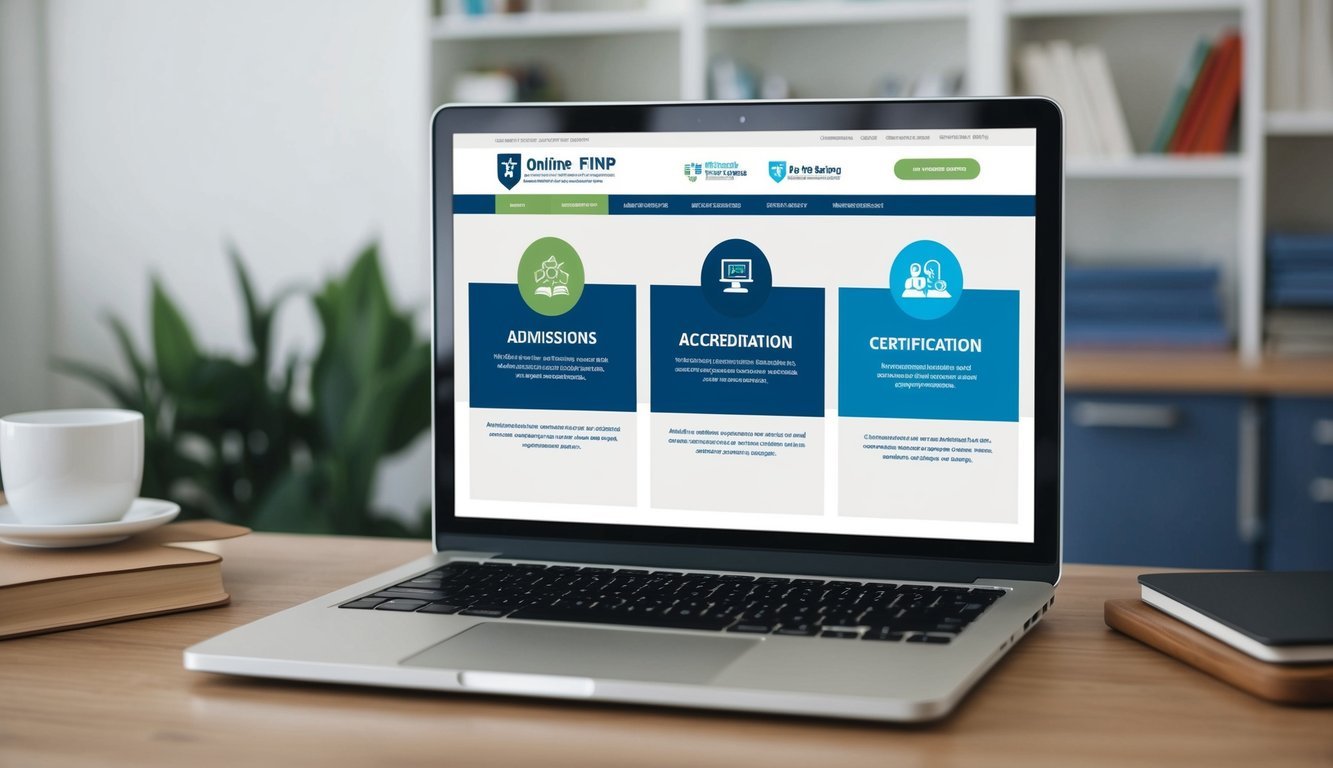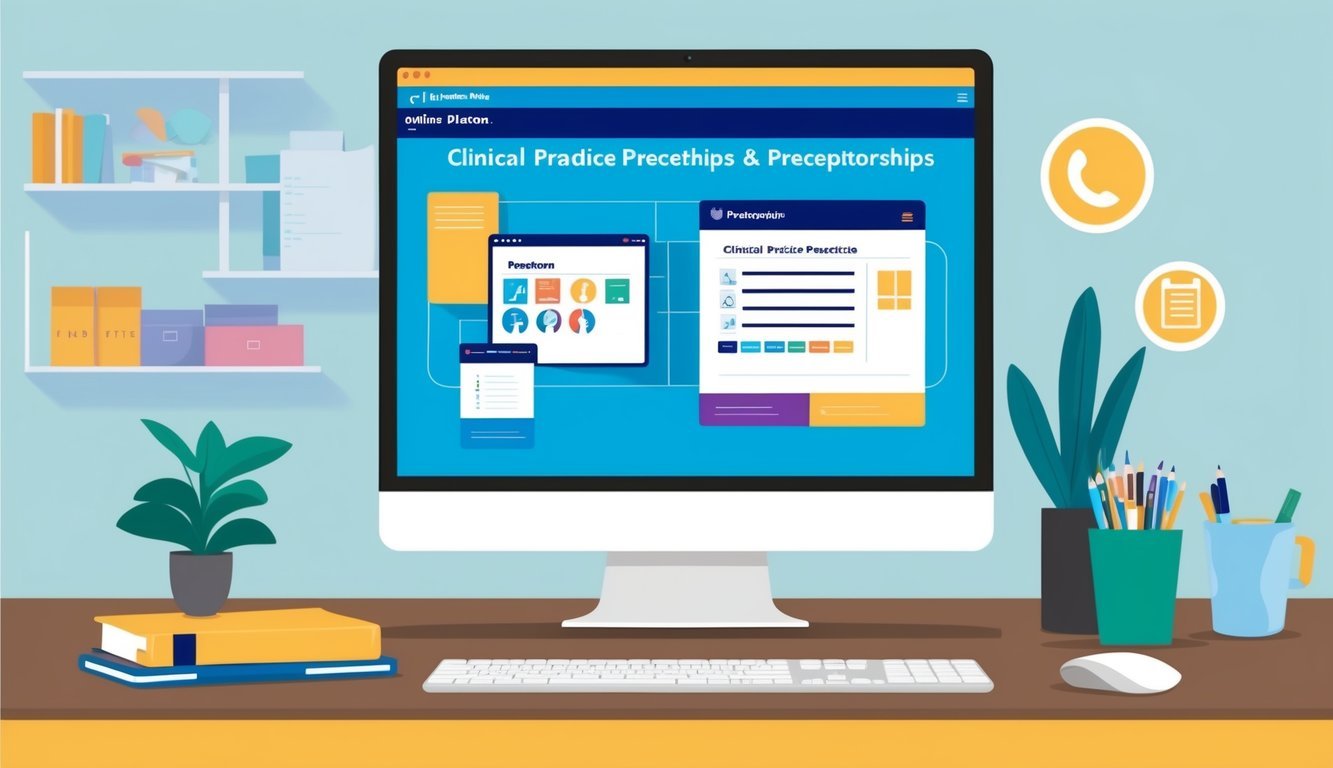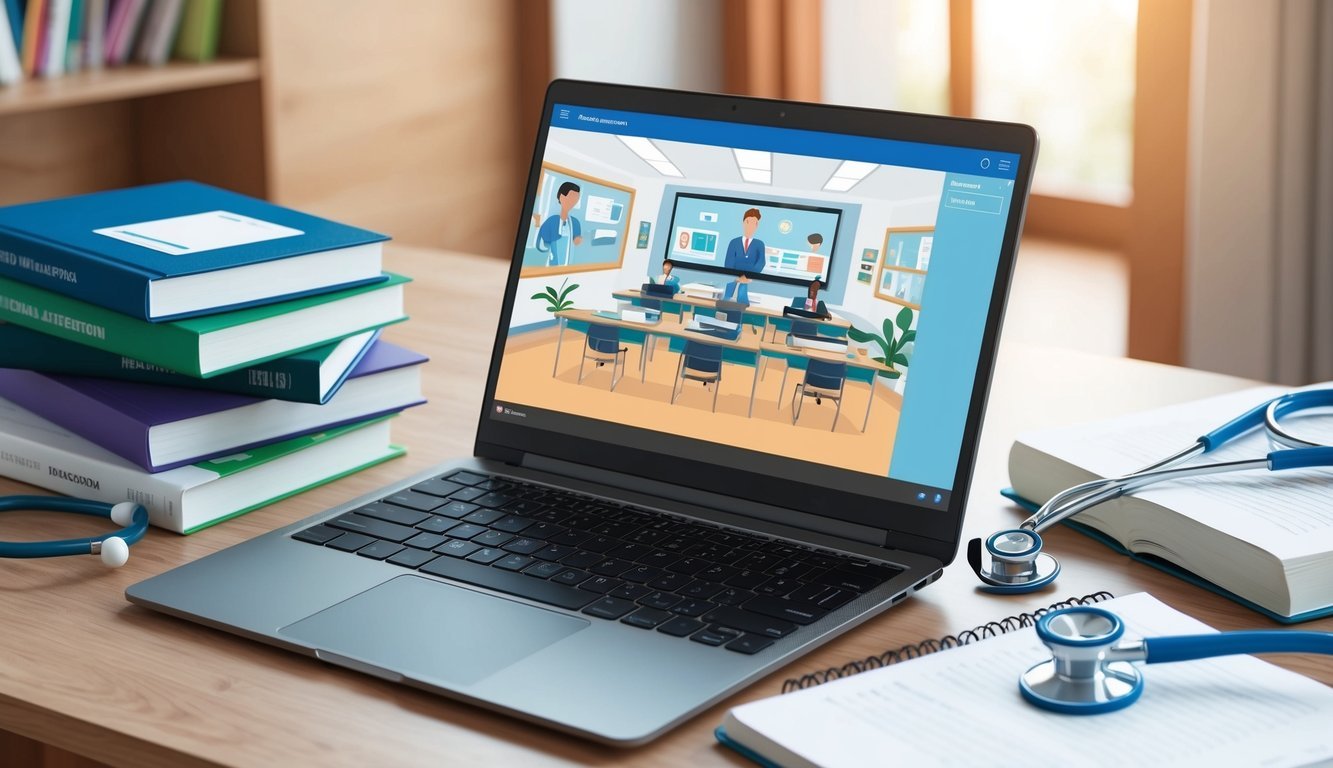The nursing field is experiencing a growing demand for healthcare services.
Pursuing a career as a Family Nurse Practitioner (FNP) offers an excellent opportunity for those in the nursing field. Online FNP programs provide the flexibility and accessibility you need to advance your nursing education while balancing personal and professional commitments. These programs are designed for Registered Nurses seeking to become Advanced Practice Registered Nurses.
They allow you to specialize in providing comprehensive primary care to diverse populations.
When exploring online FNP programs, you will find various options that accommodate different educational backgrounds and schedules.
Many institutions, such as WGU and Baylor University, offer master’s and doctoral degree pathways tailored to fit your needs.
These programs typically include a mix of coursework, clinical internships, and hands-on learning experiences to equip you with essential skills in patient assessment, diagnosis, and management.
Enrolling in an online FNP program not only enhances your clinical skills but also opens doors to advanced career opportunities in various healthcare settings.
This advanced nursing education is crucial for meeting the rising demand for skilled healthcare professionals, especially as telehealth and community-centered care continue to evolve.
By pursuing this path, you take a significant step toward making a positive impact on patient health outcomes in your community.
Exploring the FNP Role and Education Path
The Family Nurse Practitioner (FNP) role plays a critical part in the healthcare system, focusing on comprehensive patient care.
To embark on this career, you will follow a specific educational pathway and meet certain requirements.
The Role of a Family Nurse Practitioner
As a Family Nurse Practitioner, you provide holistic care to patients across their lifespan.
Your responsibilities include diagnosing and treating illnesses, conducting physical exams, and ordering diagnostic tests.
You will also develop treatment plans and manage chronic health conditions.
FNPs often work in various settings, including private practices, community clinics, and hospitals.
You may also focus on patient education, emphasizing preventive care and health promotion.
This role allows you to build meaningful relationships with patients, which is essential for delivering personalized care.
Pathway to Becoming an APRN
To become an Advanced Practice Registered Nurse (APRN), you must first obtain a Bachelor of Science in Nursing (BSN).
Following this, you can pursue a Master of Science in Nursing (MSN) with a specialization in Family Nurse Practitioner (MSN FNP Program).
Some may opt for a Doctor of Nursing Practice (DNP) for an advanced degree.
The journey typically involves Clinical Hours and passing a national certification exam.
The entire pathway can take anywhere from 2 to 6 years, depending on the program and your prior education.
Educational Requirements for FNP Programs
FNP programs generally require specific prerequisites to ensure you are prepared for advanced practice.
Most programs accept candidates with a BSN.
You should have a state nursing license and possibly some healthcare experience.
Curriculums usually cover essential topics such as pharmacology, diagnostics, and patient management.
Programs typically culminate in clinical practice, providing hands-on experience under supervision.
Depending on the school, you can choose to complete your degree online or on-campus, making accessibility a key factor in your decision.
For more detailed information on different programs, you can explore top online FNP programs.
Curriculum and Coursework for Online FNP Programs

Online Family Nurse Practitioner (FNP) programs offer a comprehensive curriculum designed to equip you with the essential skills and knowledge needed in advanced practice nursing.
The coursework typically includes core nursing courses, specialized FNP courses, and hands-on clinical training to ensure competency in patient care.
Core Nursing Courses
In your program, you’ll begin with core nursing courses that lay the foundation for advanced practice.
Key subjects include Pharmacology, Pathophysiology, and Health Assessment.
These courses provide a deep understanding of disease processes and the pharmacological principles that guide treatment decisions.
Course Content:
| Course Title | Focus Area |
|---|---|
| Pharmacology | Medication management |
| Pathophysiology | Disease mechanisms |
| Health Assessment | Patient evaluation techniques |
| Advanced Pathophysiology | In-depth study of complex diseases |
These courses are structured to promote critical thinking and clinical reasoning essential for effective patient care.
Specialized FNP Courses
As you progress, you will encounter specialized courses tailored to the Family Nurse Practitioner role.
Expect to study Advanced Practice Nursing, Population Health, and Epidemiology.
Focused Areas:
- Family Nurse Practitioner Courses: Cover assessment and management across the lifespan.
- Advanced Pharmacology: Delve deeper into pharmacological strategies for diverse populations.
Your learning will focus on integrating theoretical knowledge with clinical scenarios, preparing you for dynamic healthcare environments.
Clinical Training and Practicum
Hands-on experience is crucial in FNP programs.
You will complete significant Clinical Hours through Clinical Rotations and Clinical Practicum placements.
- Clinical Requirements: Most programs require around 750 hours of supervised clinical practice.
During these rotations, you will apply your classroom knowledge in real-world settings, working under experienced preceptors who guide your development as a competent practitioner.
Key Aspects of Clinical Training:
| Requirement | Description |
|---|---|
| Clinical Hours | Approximately 750 hours |
| Clinical Rotations | Exposure to various healthcare settings |
| Supervision | Guidance from experienced practitioners |
This blend of coursework and practical experience ensures you are well-prepared for the responsibilities of a Family Nurse Practitioner.
Admissions, Accreditation, and Certification

Understanding the admissions process, the significance of accreditation, and the certification pathway is essential for aspiring Family Nurse Practitioners.
Each component plays a critical role in shaping your educational journey and future career.
Admission Requirements for Online FNP Programs
To enroll in an online Family Nurse Practitioner (FNP) program, you typically need a Bachelor of Science in Nursing (BSN) or an equivalent degree.
Most programs require a minimum undergraduate GPA of 3.0 on a 4.0 scale.
Key admission elements often include:
- Letters of Recommendation: Usually from nursing professionals or academic instructors.
- Personal Statement: A narrative illustrating your motivations and career goals.
- Current RN License: Verification of your active and unencumbered nursing license.
Additionally, some programs may conduct interviews as part of the selection process.
Familiarizing yourself with these requirements can enhance your preparedness and strengthen your application.
Accreditation and its Importance
Accreditation ensures that FNP programs meet high educational standards.
Attending an accredited program, such as one recognized by the Commission on Collegiate Nursing Education (CCNE), can significantly impact your career prospects.
Accreditation benefits include:
- Eligibility for Financial Aid: Many scholarships and loan programs require enrollment in accredited institutions.
- Enhanced Job Opportunities: Employers often prefer graduates from accredited programs.
- Smooth Transition to Certification: Most certification exams require graduation from an accredited program.
When researching programs, confirm their accreditation status to ensure you are receiving a quality education.
FNP Board Certification Process
Upon completing your FNP program, the next step is obtaining certification.
You can pursue certification through two primary organizations: the American Association of Nurse Practitioners (AANP) or the American Nurses Credentialing Center (ANCC).
Certification requirements typically include:
- Graduation from an accredited FNP program.
- Passing the Nurse Practitioner Certification Exam: You will need to select the appropriate exam based on your chosen certification body.
Once certified, you must maintain your credential through continuing education and periodic renewal.
Familiarizing yourself with both AANP and ANCC pathways is vital for your planning and professional growth.
Clinical Practice and Preceptorships

Clinical practice and preceptorships are essential components of online Family Nurse Practitioner (FNP) programs.
They provide hands-on experience and mentorship, critical for developing competencies in patient care and clinical decision-making.
Securing the right clinical sites and understanding the role of preceptors are vital steps in this journey.
Securing Clinical Sites and Preceptors
When enrolling in an online FNP program, you will need to secure clinical sites and preceptors for your training.
Most programs offer assistance in finding appropriate placements, but being proactive can greatly enhance your experience.
Look for sites that align with your interests and career goals.
This might include hospitals, private practices, or community health centers.
Key Considerations:
- Accreditation: Ensure the site meets program requirements.
- Diversity of Cases: Choose locations that offer varied patient populations.
- Mentor Experience: Verify that preceptors have relevant experience and credentials.
Establish strong communication with both your program coordinator and the potential preceptors to ensure a smooth placement process.
The Role of Clinical Preceptorship in FNP Training
Clinical preceptorships play a pivotal role in your training as an FNP.
They provide opportunities to apply theoretical knowledge in real-world settings, enhancing your skills in patient-centered care, diagnostic reasoning, and health promotion.
Preceptors guide you through advanced physical assessment techniques and disease prevention strategies.
They evaluate your performance, providing constructive feedback that is crucial for your growth.
Benefits of Preceptorship:
- Hands-On Experience: Engage directly with patients.
- Personalized Mentorship: Learn from experienced professionals.
- Networking Opportunities: Build professional relationships for future career advancements.
You’re expected to demonstrate competence in managing patient care, fostering both clinical and interpersonal skills essential for your professional development.
Practicum and Immersion Experiences
The practicum and immersion experiences further enrich your learning journey.
These structured clinical training phases allow you to focus intensively on specific areas of practice.
Typically lasting several weeks, immersion experiences can help solidify your clinical practice hours.
You apply your skills in a focused environment, often taking on responsibilities akin to those of a licensed FNP.
Key Components of Practicum:
- Clinical Practice Hours: Complete the required hours while working with a preceptor.
- Real-Life Scenarios: Tackle case studies related to patient encounters.
- Feedback and Assessment: Regular evaluations help gauge your development.
Fostering a balance of theory and practice, these experiences are critical for building the confidence and expertise required of an FNP.
Online FNP Programs: Advantages and Career Outcomes
Online Family Nurse Practitioner (FNP) programs offer a flexible, accessible path to advanced practice nursing.
You can balance your education with professional and personal commitments while preparing for a rewarding career in healthcare.
Flexibility and Format of Online Learning
Online FNP programs provide significant flexibility, allowing you to study from anywhere at your convenience.
This format accommodates varying schedules, whether you’re working full-time or managing family responsibilities.
Many programs offer asynchronous classes, meaning you can access lectures and course materials at your own pace.
Some may require synchronous sessions for clinical training or group discussions, which provides a balance of structure and independence.
The best online FNP programs often include a mix of coursework and practical experiences.
This blend ensures you receive a comprehensive education while benefiting from the convenience of online learning.
Clinical hours typically occur in your local area, enabling you to apply your skills effectively.
Career Prospects and Earnings for FNPs
Family Nurse Practitioners have strong career prospects.
As healthcare needs grow, the demand for FNPs continues to rise.
Many graduates of online FNP programs find roles in various settings, including hospitals, clinics, and private practices.
According to the Bureau of Labor Statistics, nurse practitioners, including FNPs, earned a median annual wage of approximately $120,000 in 2022.
This figure can vary based on factors like location, experience, and specialty.
Furthermore, online Master of Science in Nursing (MSN) programs that lead to FNP certification prepare you for diverse career paths, enhancing both your professional opportunities and earning potential.
The combination of advanced education and clinical training positions you as a vital member of the healthcare team.

